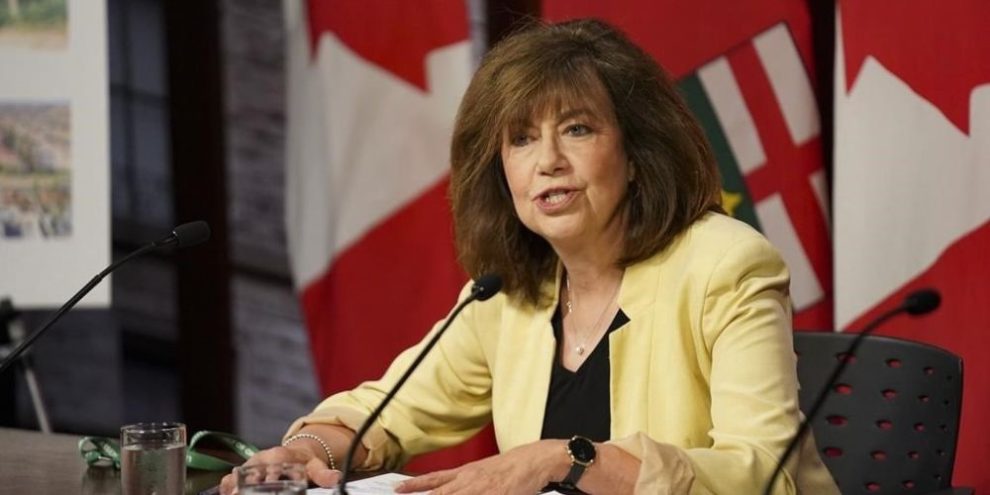
By Liam Casey
The province's decision to open up the protected Greenbelt to housing construction favoured "certain developers" with ties to the housing minister, and failed to consider the potential consequences of the move, an investigation by the auditor general has found.
Premier Doug Ford acknowledged that the process of determining which parts of the Greenbelt surrounding much of the Golden Horseshoe to develop "should have been better," but said his government would not reverse course, insisting that building in the area was crucial to achieving its housing targets.
Auditor General Bonnie Lysyk said the Ontario government "proceeded with little input from experts," and did not weigh the environmental, agricultural and financial risks and impacts of the 2022 decision to remove some lands from the Greenbelt for development, while adding others.
She said the owners of the 15 sites removed from Greenbelt protection could see an $8.3 billion increase to the value of those lands and that 14 of those sites "were brought into the exercise" by the housing minister's chief of staff, who was appointed to his role by the premier's office in July 2022.
One of the groups that benefited from the process was TACC Developments, which is owned by the De Gasparis family. Silvio De Gasparis, who was not named in the auditor general's report, has close ties to Premier Doug Ford. Another developer was Michael Rice, owner of the Rice Group.
Both TACC and the Rice Group have land on the Greenbelt that was opened up to development and both fought the auditor general's summons to answer questions about the land swap. Lysyk said she has abandoned attempts to get them to talk.
TACC's legal counsel said in a statement to The Canadian Press that there's "no way of knowing the value of the land at this point in time, as there are significant costs to develop the land, which will be paid by the developers."
"The TACC Group is one of the few developers with the breadth of experience, knowledge, and resources, as well as the land, to build complete and environmentally responsible communities to meet Ontario's housing needs," the statement added.
Lysyk said "the exercise to change the Greenbelt boundaries in fall 2022 cannot be described as a standard or defensible process.”
“The truncated and highly restricted land selection exercise excluded substantive input from land-use planning experts in provincial ministries, municipalities, conservation authorities, First Nations leaders, and the public, while giving preferential treatment to certain developers with direct access to the chief of staff to the Minister of Municipal Affairs and Housing," she added.
Lysyk also found that when some of the selected sites did not meet certain criteria, those criteria were disregarded.
"For instance, when the ministry identified that 19 of the 22 proposed sites did not meet the one environmental criteria, that criterion was dropped," Lysyk said.
She also found that 83 per cent of the land removed was of the highest quality agricultural land.
"As premier, the buck stops with me and I take full responsibility for the need for a better process," Ford said.
Ford said he only learned of the land swap the day it went to cabinet for approval, while Housing Minister Steve Clark said he learned of it the week prior. Both have previously said they did not tip off developers about the moves beforehand and denied having benefited personally from any Greenbelt policy decisions.
Lysyk said she had "no reason not to believe" Ford and Clark.
But, she added, "the housing minister ought to have known the key details of such a high profile, politically sensitive government exercise and ensure that cabinet and the premier were also made fully aware of its details."
"The actions to amend the Greenbelt boundary also call into question why the government needed to make such a significant decision so quickly."
Ford and Clark said they accept much of what the auditor general found and pledged to do better going forward.
Reacting to the report, NDP Leader Marit Stiles called for Clark's "immediate resignation" and for the land in question to be returned to the Greenbelt.
“Let’s call this what it is: corruption. Ontarians deserve better than a government that enriches a select number of party donors at the expense of hard-working Ontarians,” Stiles said.
Interim Liberal Leader John Fraser took issue with Ford and Clark saying they did not know what Clark's chief of staff was up to.
"There is no way on God's green earth that the minister's chief of staff did anything without the minister's expressed direction and full knowledge," he said. "That's not the way government works."
Asked about his future in government and whether his chief of staff would be dismissed, Clark thanked Ford for having confidence in the housing ministry's team.
"I recognize the changes that are recommended in this report and I acknowledged that we need to implement them as soon as possible," Clark told reporters.
Lysyk said the entire process to unlock portions of the Greenbelt was conducted in three weeks and was co-ordinated by Clark's chief of staff, Ryan Amato, who was not named in the report. She said the process was "biased" and lacked transparency.
Ford and Clark both told Lysyk that they were unaware that the process was being controlled by Amato.
The auditor general provided 15 recommendations to the province, including a call for the "re-evaluation of (the) 2022 decision to change the Greenbelt boundaries."
The Ford government has agreed to implement 14 of the recommendations, but rejected Lysyk's advice to review the boundary decision.
Ford also said he had "no plans right now" to open up more of the Greenbelt in the future.
Among Lysyk's other recommendations was a call for "records retention" specifically regarding emails, as some were missing when she looked for them. Personal emails were also used, she found.
After the Conservatives won the June 2022 election in a landslide, Ford directed Clark in a mandated letter to "complete work to codify processes for swaps, expansions, contractions and policy updates for the Greenbelt," the report said.
The housing ministry provided Amato with two options: an overall review of the Greenbelt or the selection of specific sites, Lysyk wrote.
Last October, Amato directed the ministry to form a small team of six to 10 public servants to assess specific sites rather than an overall review.
Amato then instructed the "Greenbelt Project Team" to not disclose any information and had them sign non-disclosure agreements.
The work was to be done quickly as part of the province's sweeping reforms on housing development, with its goal of building 1.5 million homes over 10 years.
Amato then provided the Greenbelt team with 21 of the 22 sites to be assessed for removal.
Amato told the auditor general that he selected those sites, in part, after talking to a few developers at the Building Industry and Land Development Association’s Chair’s Dinner on Sept. 14, the report said.
"Two prominent housing developers approached him and gave him packages containing information to remove two land sites from the Greenbelt," Lysyk wrote.
Amato told the auditor general that he did not open the packages immediately, but kept them in a stack in his office and added to them as more packages rolled in.
"Altogether, those who had access to the Chief of Staff at the September BILD event ended up with land removals that accounted for 6,784 acres, or 92 per cent, of the 7,412.64 acres ultimately removed from the Greenbelt in December 2022," Lysyk wrote.
One of the sites recommended for removal was part of the Duffins Rouge Agricultural Preserve.
Lysyk launched a value-for-money probe on the Greenbelt decision in January after a joint request from all three opposition leaders.
This report by The Canadian Press was first published Aug. 9, 2023.





